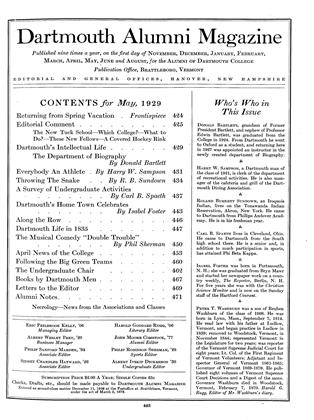The year seems to have brought an unprecedented number of lecturers to Hanover. April's offerings included John Anderson, dramatic critic; Norman Thomas, leading socialist and eminent liberal; Whiting Williams, labor expert; and Dr. Robert Millikan, physicist. Also, before vacation, Prof. Charles Bakewell, chairman of the Department of Philosophy at Yale, came to Hanover for a lecture on "Berkeley and the PresentDay Philosophy," under the auspices of the Philosophical Club.
John Anderson, dramatic critic of the New York Evening Journal, gave a talk on April 12 on "The Writer and the Changing Theatre," under the auspices of the English Department. He sketched a short history of the American stage, considered the position of the critic in relation to the drama, and summed up the present situation in the theatre, illustrating richly with anecdote. Mr. Anderson entertained.
Norman Thomas came to Dartmouth for a lecture on "Our Waning Intellectualism," under the auspices of the Round Table, on April 13. He talked on absentee ownership, collectivism in business, speculation, from the point of view of socialism. He sought individualism within the present economic system, not by its abolition. Mr. Thomas impressed as a speaker.
Whiting Williams followed on the heels of Norman Thomas with a series of Tuck School lectures on "Human Relations in Business and Industry," and a Round Table address on "Economic Justice Under Mussolini, Stalin, and Hoover." Mr. Williams, for the past ten years a staff lecturer in Tuck School, impressed as usual as a personality, an expert, and a man of experience.
Dr. Robert A. Millikan continued the series of lectures relating to "Religion as an Integral Factor in Life," under the auspices of the College, with an address on the subject of "Religion in the Universe of Science," on April 15. Many of his hearers expressed regret that he devoted so little attention to the world of science, in which he is such a preeminent figure.
 View Full Issue
View Full Issue
More From This Issue
-
 Article
ArticleA Survey of Undergraduate Activities
May 1929 By Carl B. Spaeth -
 Class Notes
Class NotesClass of 1898
May 1929 By H. Phillip Patey -
 Lettter from the Editor
Lettter from the EditorFor opinions which appear in these columns the Editors alone are responsible
May 1929 -
 Class Notes
Class NotesClass of 1923
May 1929 By Truman T. Metzel -
 Article
ArticleDartmouth Life in 1835
May 1929 -
 Class Notes
Class NotesClass of 1910
May 1929 By Arthur P. Allen
Albert I. Dickerson
-
 Article
ArticleNon-Athletic Council
June 1929 By Albert I. Dickerson -
 Article
ArticleOn the Hanover Stage
June 1929 By Albert I. Dickerson -
 Class Notes
Class NotesClass of 1930
December 1932 By Albert I. Dickerson -
 Class Notes
Class NotesClass of 1930
April1935 By Albert I. Dickerson -
 Class Notes
Class NotesClass of 1930
March 1938 By Albert I. Dickerson -
 Class Notes
Class Notes1930*
November 1938 By ALBERT I. DICKERSON







